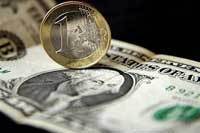Dollar advances from two-month low vs. euro
 The dollar advanced from a two-month low against the euro before U.S. data this week that economists said will show a growing economy and increasing consumer confidence.
The dollar advanced from a two-month low against the euro before U.S. data this week that economists said will show a growing economy and increasing consumer confidence.
Japan's yen depreciated against 11 of its 16 most-traded counterparts as rising stocks in Asia and Europe sapped demand for the safest assets. The euro weakened, snapping a four-day advance, after the collapse of the Irish coalition government threw budget plans into disarray. The pound fell before a report that economists said will show U.K. growth slowed, according to BusinessWeek.
Over the weekend, the Green Party said that it will leave the Republic of Ireland's governing coalition, which will cost the ruling party its majority and mean it's unlikely to survive this week's confidence vote.
In addition, Irish Prime Minister Brian Cowen said on Saturday that he will step down as the leader of the Fianna Fail party.
"The Greens will support the minority government long enough to pass the finance bills required for the release of bailout money from the European Union and the International Monetary Fund this week, however. So while events over the weekend add to political uncertainty at the margin, they are unlikely to have a large impact on foreign exchange, in our view," said strategists at Barclays Capital.
A more important driver for the euro against the dollar is likely to be oil prices, the strategists said. Oil futures added 48 cents to $89.59 a barrel in electronic trading on Monday, according to MarketWatch.
Subscribe to Pravda.Ru Telegram channel, Facebook, RSS!




